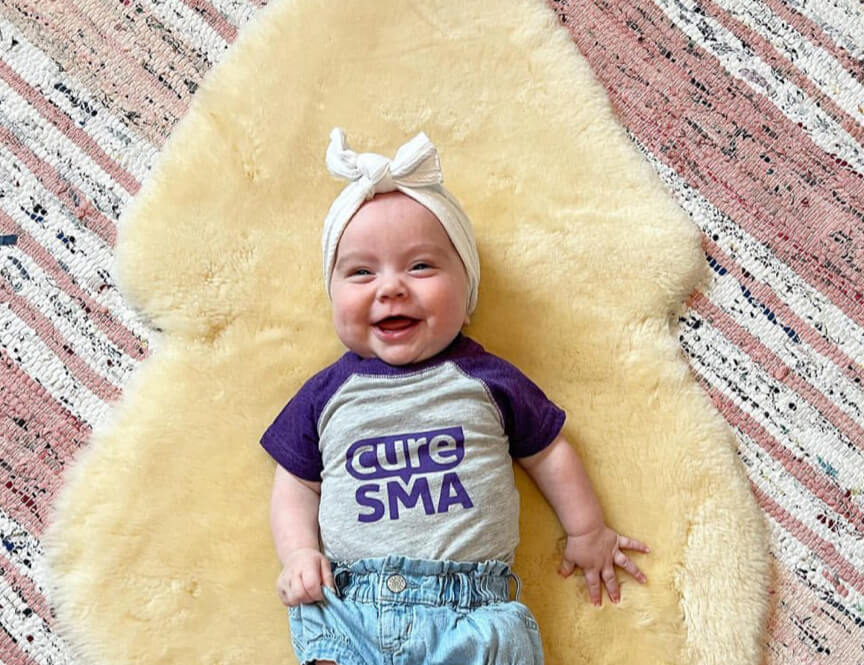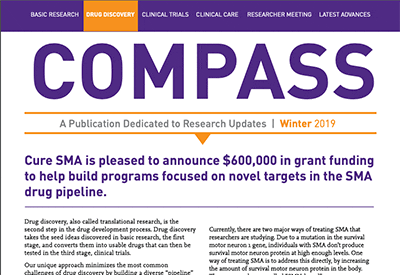Dear members of the SMA community,
As we celebrate Rare Disease Day 2019, we are honored to continue supporting the spinal muscular atrophy (SMA) community. In recent weeks and months, we engaged the community on a number of different initiatives and are excited to share updates on our activities, support of new clinical research and a new partnership to develop potential innovative treatments for SMA.
Rare Disease Week, which takes place February 24 to 28, offered the opportunity to support the EveryLife Foundation for Rare Diseases and the National Organization for Rare Disorders to highlight topics that are important to the SMA community, such as reauthorization of federal newborn screening legislation which could pave the way for early diagnosis and treatment of SMA and other rare diseases.
A central focus of our support of the SMA community is increasing access to SPINRAZA® (nusinersen), which is now available in more than 40 countries. We continue to work with partners and authorities worldwide to bring SPINRAZA to all who may benefit.
More than 6,600 infants, children and adults have been treated with SPINRAZA worldwide*, including over 2,600 in the US at sites in all 50 states. Additionally, the following information is also from recent experience in the US:†
- The broad range of patients treated includes those as young as 3 days‡ to 79 years old§
- >95% of patients who started SPINRAZA remain on treatment
- >35% of patients are aged 18 years or older
More information and resources can be found online about Biogen’s support programs such as SMA360°TM, a support service for US individuals with SMA, families and caregivers, and the Support and Treatment Education Program (STEP), which offers free educational events to learn more about SPINRAZA and connect with others in the SMA community.
Introducing new research on adults with SMA
In late 2018, Biogen, through a collaborative effort, is supporting a new multicenter study, “SPINRAZA in Adult Spinal Muscular Atrophy,” that is currently recruiting participants in the US, with plans to expand to additional sites. The study will examine the safety, tolerability and effectiveness of SPINRAZA in adults with SMA. We look forward to future release of the completed study’s findings, which may broaden our understanding of how SPINRAZA helps adult populations. To learn more, please visit www.clinicaltrials.gov (NCT number: NCT03709784).
Sharing educational information about intrathecal administration
Intrathecal administration of SPINRAZA, particularly in individuals with complex spines, continues to be an important challenge for members of the SMA community – and we are working to identify potential solutions. Several publications from 2018 demonstrate the feasibility of intrathecal administration for individuals with SMA in the real-world setting, including those with complex spinal anatomies. These publications are included in the Journal of Pediatric Orthopaedics, Muscle & Nerve, Neurology and Pediatric Radiology. In 2019, Biogen will continue to provide information and help facilitate the sharing of knowledge among healthcare providers in order to help individuals with SMA.
Advancing Our SMA Partnerships and Pipeline
We are also pleased to share news of our recent agreement with Skyhawk Therapeutics to discover innovative small molecule treatments for individuals with SMA and other neurological diseases. Skyhawk’s novel approach targets ribonucleic acid (RNA) splicing to develop therapies, and this collaboration expands on Biogen’s existing SMA research, which may lead to discovering and developing future therapies.
In addition, we continue to investigate potential options for new antisense oligonucleotide (ASO) therapies. SPINRAZA uses innovative ASO technology to help individuals with SMA maintain and increase motor function, and we aim to build on this success as we examine possible ASO candidates as potential future treatments in SMA.
On Rare Disease Day and year-round, we are proud to support the SMA community – individuals, families and caregivers alike. We are committed to providing therapeutic options and improving access to therapies for individuals with SMA around the world who may benefit from treatment. We continue to strive to provide support for individuals with SMA, caregivers, and families, and look forward to providing future updates about SPINRAZA and our research.
Best regards,
The Biogen SMA Team
INDICATION
SPINRAZA® (nusinersen) is a prescription medicine used to treat spinal muscular atrophy (SMA) in pediatric and adult patients.
IMPORTANT SAFETY INFORMATION
Increased risk of bleeding complications has been observed after administration of similar medicines. Your healthcare provider should perform blood tests before you start treatment with SPINRAZA and before each dose to monitor for signs of these risks. Seek medical attention if unexpected bleeding occurs.
Increased risk of kidney damage, including potentially fatal acute inflammation of the kidney, has been observed after administration of similar medicines. Your healthcare provider should perform urine testing before you start treatment with SPINRAZA and before each dose to monitor for signs of this risk.
The most common possible side effects of SPINRAZA include lower and upper respiratory infections, constipation, headache, back pain, and post-lumbar puncture syndrome. These are not all of the possible side effects of SPINRAZA. Call your healthcare provider for medical advice about side effects. You may report side effects to FDA at 1-800-FDA-1088.
Before taking SPINRAZA, tell your healthcare provider if you are pregnant or plan to become pregnant.
Please see full Prescribing Information.
This information is not intended to replace discussions with your healthcare provider.
*Based on commercial patients, early access patients and clinical trial participants as of December 2018.
†Based on commercial patients in the US (including Puerto Rico) as of December 2018.
‡Includes clinical trial patients.
§Clinical studies of SPINRAZA did not include sufficient numbers of subjects aged 65 and over to determine whether they respond differently from younger patients.



